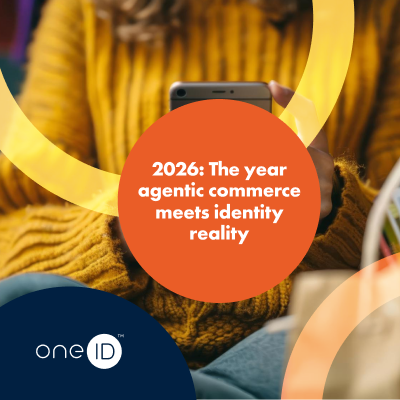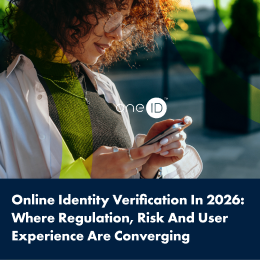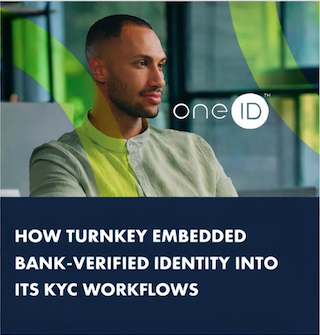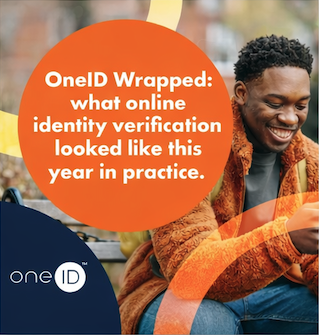As fraud becomes more sophisticated with the rise of synthetic IDs, deepfakes, and AI-generated scams, businesses need robust digital identity solutions to protect themselves and their customers. The recent OneID®-hosted webinar brought together industry leaders to discuss how truly digital IDs will prove crucial in the battle against fraud and driving secure, frictionless business operations.
The webinar, ‘How can the UK accelerate digital ID to tackle deepfakes and fraud?’, moderated by digital identity thought leader and visionary David Birch, illuminated key trends, challenges, and solutions in the digital ID space. On the panel were key figures like Stephanie De Bruyne, CEO of itsme, Martin Sansone, Lead Standards Architect for Pay.Uk, Sergei Fedorov, Head of Onboarding for Sumsub and Paula Sussex, OneID® CEO. The discussion illuminated the pressing need for digital identity solutions and the path forward for the UK.
Stephanie De Bruyne, CEO of itsme, opened the discussion by sharing the success story of itsme, a digital identity app launched in Belgium in 2017. Created by a consortium of major banks and telecommunications companies and later joined by the Belgian government, itsme allows citizens to identify themselves online and confirm transactions securely. This initiative was driven by a need for robust remote identification processes in heavily regulated sectors.
Stephanie highlighted that itsme now serves over 80% of the Belgian population, processing more than 30 million monthly transactions. itsme's secure, passwordless design has significantly reduced fraud, contributing to a 26% decrease in losses due to cybercrime. Importantly, itsme’s model has demonstrated that digital identity is not just a tool for convenience but a societal asset, contributing to fraud prevention and digital inclusion.
The security features of itsme, including multifactor authentication (MFA) and a completely passwordless interface, make it highly resistant to fraud. The app requires users to authenticate transactions using a combination of their phone, app, and PIN code, rendering it unphishable. By empowering users and businesses with a secure and simple solution, itsme has transformed the Belgian digital landscape, setting a solid example for the rest of Europe.
Martin Sansone, Lead Standards Architect for Pay.Uk added his perspective on digital identity’s role in fraud prevention across the UK’s financial sector. He shared how, in Sweden, Bank ID can facilitate the checks and steps needed to complete the purchase of a house in a couple of hours—frictionless and unbelievably fast.
The seamless integration of digital identity into the Swedish economy highlights its potential to enhance security and streamline business processes, bringing efficiency gains across industries.
In the UK, where fraud rates remain alarmingly high, Martin stressed that digital identity offers a clear solution. By leveraging bank-verified identities, the UK can restore trust in its payments system, reduce fraud, and provide more assurance for businesses and consumers alike.
Lessons for the UK: leveraging the trust in banks
While the UK lacks the formal ID card system that laid the grounds for nationwide adoption of an identity service like itsme, significant progress is being made. For the UK to fully realise the benefits of digital identity, the government and other financial institutions need to ramp up support. The recent progress on the Digital Information and Smart Data Bill is a step in the right direction, but broader public and private engagement is crucial.
Trust is crucial when interacting online. Banks are already the custodians of people’s trust. They are recognised for their due diligence and security practices, which is why people default to banks to protect their money.
This trust in banks is at the core of OneID®'s bank-based digital identity verification service. OneID® has partnered with almost every bank on the high street bank and from the digital sphere – making it easy for the 50 million UK individuals with an online banking account to verify themselves.
Paula stressed that bank-based digital identity operates at the sweet spot of delivering strong fraud prevention while speeding up business processes and enhancing customer experience. This golden triangle makes fast-growing, agile businesses turn to OneID® for a robust and frictionless verification process.
One of the key challenges discussed during the webinar was the growing threat of deepfakes and AI-driven fraud. David Birch cautioned that AI could offer solutions but is also part of the problem. Deepfakes are advancing at an alarming rate, and relying solely on AI and biometric technologies like facial recognition may not be enough to combat these sophisticated threats.
David argued that a reliable digital identity system is the only long-term solution to this escalating problem. While AI can help detect certain types of fraud, it is a race against time, with bad actors constantly developing new methods to evade detection. A trusted digital identity, such as OneID®, anchored in secure, bank-verified data, provides higher protection against these emerging threats.
The results: when a financial service does document-free KYC
Implementing digital identity solutions like OneID® has been a game-changer for the financial services business Anna Money. Integrating OneID®'s completely digital identity verification system into their customer onboarding process significantly reduced the friction traditionally associated with KYC and AML compliance. This streamlined approach expedited onboarding times and enhanced security, reducing the risk of human error or document-based fraud.
According to Sergei, ‘there’s been a 50% reduction in onboarding time and a marked increase in customer satisfaction, with users appreciating the seamless, document-free process. By eliminating manual steps, we’ve also decreased operational costs, allowing us to focus on delivering better services to our clients. Implementing the solution was easy, too. OneID® has proven to be an invaluable partner in helping us stay compliant while improving overall efficiency.’
Paula pointed out that SMEs often move faster than larger corporations when adopting digital identity solutions. These businesses recognise the commercial benefits of reducing fraud and improving security through solutions like OneID®. With government assurance and appropriate price points, SMEs are showing that the benefits of digital identity are not just theoretical but tangible and measurable.
These businesses also consider digital identity verification a digital transformation point. For them, it’s about raising their defences against fraud and driving up cost, time, and resource efficiencies. OneID®’s document-free and autonomous process lets them focus their valuable resources where they need them the most.
The success of digital identity and its ability to protect the UK’s digital economy entirely hinges on the collaboration between the government, financial institutions, and the private sector. As Paula noted, while innovative businesses are already proving the model works, wider infrastructural support is needed to realise the benefits fully.
Stephanie also emphasised the importance of collaboration, drawing on itsme’s experience in Belgium, where banks, telecommunications companies, and the government played a role in its successful rollout. This collaborative approach ensured trust and credibility and enabled rapid adoption across multiple sectors.
It is clear that in the age of deepfakes and synthetic IDs, relying on traditional methods of selfies, video scans, and document uploads is like hiding the house keys under the front doormat. It’s so easy. The solution is an entirely digital verification method leveraging the strongest protection measures.
Using bank-verified digital identity data ticks many boxes—fraud prevention, convenience, efficiency, modernisation, inclusivity, and more. The ease of access and reduced online fraud in Belgium, Sweden, and other Nordic countries prove the concept’s efficacy in real life.
While the UK still has some way to go, the progress being made by innovative solutions like OneID® is encouraging. With the right level of collaboration between the government, financial institutions, and businesses, the UK has the potential to become a leader in digital identity.
Watch the on-demand webinar to deep dive into the insights.

Agentic commerce is already operating inside live retail, payments, and platform environments. For Partn...

Online identity verification entered a new phase in 2025. Across adult platforms, gambling, financial se...

Last month, we joined Turnkey for an industry event to talk about a challenge many regulated platforms a...

2025 has been a year of continued growth and real-world proof for OneID®. As expectations for identity a...